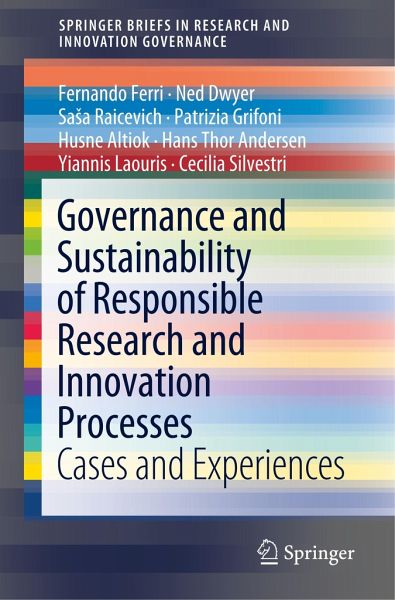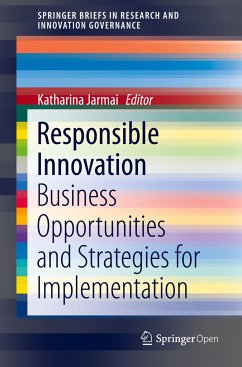
Governance and Sustainability of Responsible Research and Innovation Processes
Cases and Experiences
Mitarbeit: Dwyer, Ned; Raicevich, Sasa; Grifoni, Patrizia; Altiok, Husne; Andersen, Hans Thor; Laouris, Yiannis; Silvestri, Cecilia; Forsberg, Ellen-Marie; Shelley-Egan, Clare; Ladikas, Miltos; Owen, Rich

PAYBACK Punkte
19 °P sammeln!
This book provides methods and practical cases and experiences with the aim of stimulating Responsible Research and Innovation (RRI) through the direct engagement of researchers, Civil Society Organisations (CSOs), citizens, industry stakeholders, policy and decision makers, research funders and communicators. The book furthermore aims to advance debate on Responsible Research and Innovation and also to reinforce the RRI community identity. With chapters covering governance, public engagement and inclusion in responsible R&D and innovation processes; RRI actions in science education and commun...
This book provides methods and practical cases and experiences with the aim of stimulating Responsible Research and Innovation (RRI) through the direct engagement of researchers, Civil Society Organisations (CSOs), citizens, industry stakeholders, policy and decision makers, research funders and communicators. The book furthermore aims to advance debate on Responsible Research and Innovation and also to reinforce the RRI community identity. With chapters covering governance, public engagement and inclusion in responsible R&D and innovation processes; RRI actions in science education and communication; gender and ethical issues in RRI initiatives; and sustainability of RRI processes, the book is solidly part of the Europe 2020 strategy to promote a vision for a stronger collaborations between social, natural and physical scientists and the societal actors for a wider dimensions of science and innovation and the role in environmental preservation.
Chapters 1 and 3 are open access under a CC BY 4.0 license via link.springer.com.
Chapters 1 and 3 are open access under a CC BY 4.0 license via link.springer.com.












